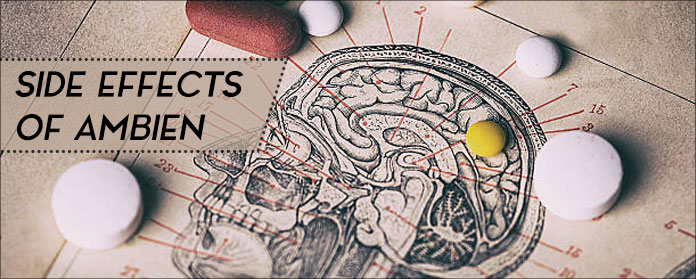Around 25% of Americans suffer from acute insomnia each year. To combat this issue, many people turn to prescription sleep aids.
Ambien (zolpidem) is one of the more popular sleep medications on the market. It belongs to a class of drugs referred to as sedative-hypnotics. These drugs work by depressing the central nervous system so patients can fall asleep faster and stay asleep throughout the night.
Ambien was introduced in the 1990’s as a short-term sleep medication which lacked the side effects of other sedatives. However, as the drug became more popular, patients and doctors started noticing serious side effects. Some of them are extremely dangerous.
If you’re currently on Ambien or are considering asking your doctor about it, you need to understand the risks associated with the drug. Let’s go over ten common side effects of Ambien.
-
Drowsiness
One of the more common Ambien side effects is a feeling of drowsiness the following day. This can easily hinder your ability to function normally.
Ambien is an extremely strong drug. Even if you sleep well throughout the night, if the drug is still in your system you may not feel rested.
Everyone metabolizes drugs differently, so there’s really no way to know if this will happen to you. Severe drowsiness is more likely if you take the drug too late and don’t get a full eight hours of sleep.
-
Feeling Intoxicated
After taking Ambien, you may feel a type of high. This happens if you take the drug but remain awake and active. It’s also possible if you take it on an empty stomach.
This is definitely one of the dangers of Ambien. You may experience a lack of coordination and impaired judgment. This is why it’s recommended you only take Ambien right before bed.
You may also feel hungover the next day. You could experience grogginess, lightheadedness, and nausea.
-
Dizziness
Depending on the way your body metabolizes Ambien, you may experience dizziness. This could happen shortly after you take it or when you get up in the morning. You may even feel dizzy hours after you wake up.
This is another potentially dangerous side effect, as there’s a risk of injury due to falls. Operating a vehicle while dizzy is also very dangerous.
If you experience this side effect, you should discontinue use and talk to your doctor.
-
Sleep-Eating
Ambien is known to cause a number of behavioral issues referred to as parasomnias. In a nutshell, this means carrying out certain actions, having strange dreams or experiencing hallucinations while still in a sleep state.
Sleep-eating is one of the more common parasomnia side effects of Ambien and other sleep aids. This involves eating food while still asleep.
This may sound harmless, but it’s quite possible to over-consume food, eat undercooked items, or actually attempt to prepare food while still in a sleep state.
People who experience this usually wake to find their kitchen a mess and may feel sick due to over-consumption.
-
Sleep-Driving
Another type of parasomnia associated with Ambien is sleep-driving. This involves getting out of bed and operating a vehicle while still asleep. People who sleep-drive usually have no memory of the event.
This is obviously one of the most dangerous side effects of Ambien. You risk getting pulled over and arrested for driving under the influence. Or worse, you could cause an accident leading to serious injury or death.
-
Memory Loss
Ambien has the potential to cause short-term memory loss. You may forget details of the previous night just prior to taking the drug. You also may forget small details during the night, like getting up and going to the bathroom.
You may exhibit strange behavior shortly after taking Ambien and have no recollection of the event. This is more likely to occur if you don’t fall asleep shortly after taking the drug.
You may not recall details like what you watched on television or a conversation you had with your spouse directly before bed.
-
Stomach Issues
Because Ambien slows down your central nervous system, it can also affect the speed of digestion.
This can result in a number of gastrointestinal problems. These may include minor nausea or stomach cramps. In more extreme cases you may experience vomiting.
These side effects could also result from an allergic reaction to the drug. If you experience stomach issues, discontinue use and speak to your doctor.
-
Headaches
Another very common side effect is headaches either directly after taking Ambien or the next morning.
When your body wakes up during REM sleep, there’s a chance you may have a headache and feel disconnected. Because Ambien alters your sleep patterns, you may begin waking up at different times until your body adjusts to getting good sleep.
For some people, headaches are unavoidable after taking sleep aids. If they start to affect the way you perform during the day, talk to your doctor.
-
Psychological Side Effects
Because Ambien effects brain chemicals that influence neurological activity, there’s a chance of a number of psychological effects. These can be very dangerous.
Aside from memory loss, which we already discussed, Ambien may cause depression, anxiety, loss of emotions, and even suicidal thoughts.
These side effects can have a negative impact on your ability to function normally day-to-day. If you experience any of these, it’s imperative you speak to your doctor immediately.
-
Addiction
Although Ambien is said to help with sleep disorders without the threat of addiction, it’s very possible to form a dependency to the drug. This may result in developing a tolerance to Ambien, after which you may start taking more than the recommended dose.
After prolonged dependence, you may also suffer withdrawal symptoms while trying to discontinue use. These symptoms may include anxiety, irritability, sleeplessness, and nausea.
If you’re prone to addiction or have a history of drug use, you’re at a higher risk of developing a dependence. If you feel you’ve formed an addiction to Ambien, seek help right away.
Watch Out for These Side Effects of Ambien
Finding a natural remedy for sleep disorders is always your best bet. If you rely on a sleep aid, you need to remain aware of potential risk factors. The side effects of Ambien discussed above can present serious health issues and can even result in dependence.
If you feel you’ve developed an addiction, seek help right away. You can also check out our blog for more articles on drug use and dependency.





